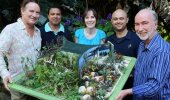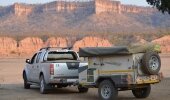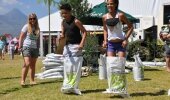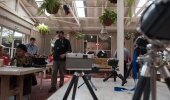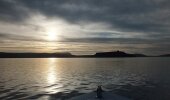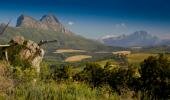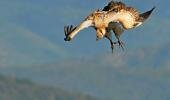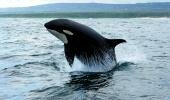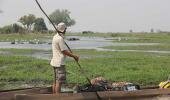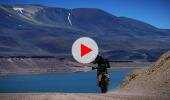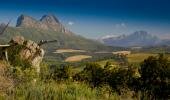Words & Photos: Sam Bradley
I have always looked on tour guiding as a job straight from heaven. You get to travel to exotic locations, meet interesting people, live in 5-star luxury - and get paid for it! So when I was recently asked to help out on a student trip to Botswana, I jumped at the chance. Finding out that we’d be exploring the Okavango Delta (a place that I really wanted to see), and that the ratio was a rather favourable 26 girls to 2 guys only increased my excitement for the trip. But, as I was to find out, taking a bunch of girls camping for a week is easier said than done.
Our group met at OR Tambo Airport, in Johannesburg, where the other guide, chef, driver, and 28 excited American students all gathered. We boarded Big Annie, our hefty two-ton overland truck, and set off for the border. Big Annie was even slower than she looked, but sitting high up, with the canvas windows rolled up, a nice breeze blowing and a bird’s eye view of the surroundings gave the trip an immediate ‘safari in Africa’ sort of feel to it.
The first two days were spent almost entirely on the road. Having so many people in such a confined space for two days could have been a disaster, but luckily everyone seemed to get on pretty well and it was a very merry safari truck. The salt pans were quite a sight, but we barely paused as Big Annie took a while to slow down and even longer to start up again, so it was best to keep moving. By the end of the second day, we had some very bored individuals on board (the only distraction we had was counting donkeys – Botswana seems to have way too many of these mules), so we were happy to finally arrive in Maun, a town on the shores of the Delta. Early the next morning, we loaded up light travel bags, piled into a truck, and were soon ready to board the mokoros. We were a little delayed as one of the girls was very concerned about mice in the Delta and refused to get into her mokoro until we had convinced her that this was one of the animals she definitely didn’t need to worry about.
The oarsmen are insanely skilful. The whole Delta is pretty shallow, so they stand on the back of the mokoro and steer it along by pushing a long wooden stick off the bottom. For the first half an hour, everyone was blown away by the beauty of it all: marshy swampland as far as the eye can see, beautiful plant life, and millions of little animals flying, crawling, and swimming all around us. However, it wasn’t long before the peaceful motion of being gently pushed along (and the warm sun on our faces) had most of us in a blissful snooze.
I was in a mokoro with our chef, Tichawena, who had become a little too acquainted with hippos on a previous trip and was keeping a sharp eye out for what he referred to as 'those dangerous beasts'. Thankfully, we managed to avoid hippos and crocs for the whole trip. After about two hours of gliding through this water wonderland, we landed at our little island and soon had camp set up. Tich prepared lunch while we explored our paradise, which would be home for the next three days.
With so few possessions, we probably should have got bored during our time on the island, but somehow we never did. We spent hours trying to learn to steer a mokoro in a straight line and ended up spending a lot of time falling off – and even by the end of the trip none of us had mastered this very tricky art! We also spent a lot of time playing the water version of American football – a game involving a tennis ball, a few mokoros, and an underwater camera, which kept us endlessly entertained.
For some of the girls, the camping lifestyle took a while to get used to. Top of the complaints list were the mosquitoes at night and the idea of having to dig a hole for a toilet. The lack of internet and music also got a mention, but luckily, everyone soon adjusted to life in the bush. On one of the afternoons, we went for a sunset mokoro cruise, sticking to the shallower water to avoid hippos as most of us were swimming behind the mokoros. In the mornings, our local guides took us for long game walks, and even though we didn’t see an abundance of wildlife we did leave very impressed with their knowledge of the whole Delta area. The hot days were spent lazing in the shade and swimming in the Delta, and the evenings around the fire and sleeping under the stars all blended together, and pretty soon it was our last day.
On the final evening, the mokoro oarsmen and guides entertained us with a song and dance performance, which we tried to match with a few of our own songs, but definitely came off second best. The next morning we planned to be on the water at 8 a.m. to get back to meet our truck, but on our early morning game walk the guide found lion spoor tracks … Needless to say we got a bit ‘sidetracked’ and only returned to camp late morning. All was fine though as we met up with Big Annie again, said our sad goodbyes, and continued on our merry adventure.
Travel tips
Flights: Air Botswana flies directly from Johannesburg to Maun for about R1,500 per person, one way (including taxes).
Accommodation: Accommodation options vary greatly, and can be found from R80 per person sharing (see Drifters Maun Camp) up to R3,320 per person sharing (Nxamaseri Island Lodge).
Trips into the Delta: Camping trips in the Delta are priced between R1,000 and R2,000 per person, per day in the Delta, with boating safaris, private trips and tented safaris also available at a higher cost.
Currency: 1 pula = R1.
Must pack items: A camera, costume, hat, and sunscreen.
